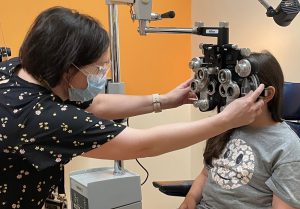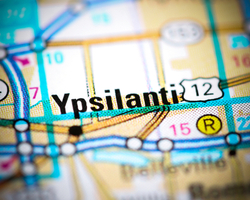Washtenaw Health Initiative members and stakeholders are encouraged to vote for the WHI’s inaugural Collaborative Health Impact Award before the October 11 selection deadline (deadline extended to October 17). The new award, developed to honor the 10th anniversary of the Washtenaw Health Initiative, recognizes collaborations that have had a significant and positive impact on community health during the COVID-19 pandemic.
The WHI believes that collaboration, partnerships, networks, and other joint efforts can be used to solve complex problems that no single individual or organization can solve in isolation. Collaborative efforts like these will be required if we are to dramatically improve health, health equity, and health care for Washtenaw County’s low-income, uninsured, underinsured, and vulnerable populations.
The nominated health improvement collaborations described below address both traditional health access and quality initiatives, as well as key social determinants of health such as food, housing, and transportation.
Learn about the 2021 nominees, then vote belo
 Hoteling those experiencing homelessness during the pandemic
Hoteling those experiencing homelessness during the pandemic
In the early days of the COVID-19 pandemic, Washtenaw County’s homeless were at particular risk of infection. Partly, they were at risk because they often sleep in congregate living facilities, where infections can spread rapidly. But they were also at risk because homeless populations are at higher risk of mortality in general.
Those that are chronically homeless have life expectancies 15- 20 years less than the general population. Homeless populations may also face more significant challenges when managing chronic conditions such as diabetes, asthma, heart disease, mental illness, and HIV/AIDS. Instances of chronic health conditions can be up to six times higher in homeless populations.
Dr. Ravi Vadlamudi from Packard Health and Dr. Holly Murphy from St. Joe’s helped assemble a formal plan to ensure safe housing for residents in the shelter. But they also worked with other community partners to secure funding to place the county’s homeless in individual hotel rooms with the support of community partners/funders including Washtenaw County and the City of Ann Arbor.
Those hotel rooms provided more than safe shelter; they offered doors, beds, bathrooms, and telephones and acted as a “home base” for residents who rarely have one. This allowed Washtenaw County Community Mental Health staff and other service providers to check in with residents daily, helping with their health, mental health, and social service needs.
Read more
 Increasing food distribution during the pandemic
Increasing food distribution during the pandemic
Food Gatherers is the most extensive anti-hunger program in Washtenaw County, whose mission is to alleviate hunger and eliminate its causes in our community. They partner with 170 nonprofit organizations and programs in Washtenaw County to provide free groceries, hot meals, and other resources to those in need.
At the beginning of the COVID-19 pandemic, Food Gatherers partner agencies reported an increase of those seeking food assistance of 30 to 300 percent, and in 2020, at the beginning of the pandemic, 40 percent of food pantry visitors were first-time customers.
In response to this expanding need, Food Gatherers increased their distribution efforts by delivering more frequently to existing sites, and providing more food at no cost to partner programs. They also made connections with new partners to ensure that the county’s most vulnerable residents, such as children, older adults, and those at high risk of contracting COVID-19, had access to nutritious food.
Read more
 Distributing masks to our Spanish-speaking community
Distributing masks to our Spanish-speaking community
In March 2021, the Washtenaw Interfaith Coalition for Immigrant Rights (WICIR), with assistance from the Washtenaw Health Department, the Michigan Immigrant Right Center (MIRC), and volunteers from the University of Michigan School of Public Health, helped distribute KN95 masks, hand sanitizer, and legal information at Dos Hermanos Mercado in Ypsilanti.
The collaborative focused their efforts on locations where members of the Spanish-speaking community frequented to distribute as many supplies as possible. They also took supplies to front-line workers on job sites.
Distributing supplies enabled the advocates to reach a population that traditionally lives and works in close quarters and may not have access to PPE. Latino residents make up 5 percent of Washtenaw County’s population.
In addition, the MIRC handed out fliers with legal information. Further, into the pandemic, this collaboration worked to increase vaccine availability and uptake in the Latino community.
Read more.
 Expanding health services for children during the pandemic
Expanding health services for children during the pandemic
The Regional Alliance for Healthy Schools (RAHS) is a network of School Based Health Centers embedded in a selection of schools in the Ann Arbor, Ypsilanti, and Lincoln school districts, in addition to five school districts in Flint, MI. Conceived in 1992 as a collaboration between the Ann Arbor Public Schools and the Ann Arbor Youth Task Force, the alliance was developed to provide easily accessible health care for students up to 21 years old regardless of ability to pay.
Traditional RAHS services range from sick visits to immunizations to sports physicals to mental health services, vision screening, glasses, and visits with registered dietitians. Locating the health centers in schools removes barriers related to transportation and follow-up visits. Students seeking medical care could access the services immediately, in a youth-friendly setting where they feel comfortable.
In response to the COVID-19 pandemic, RAHS offered virtual visits, expanded their mobile health services unit, and offered COVID vaccinations for eligible youth. In the past 12 months, RAHS has provided mental health services for 954 youth and vision services for 100 youth. In addition, RAHS shared numerous COVID-19 facts, testing, and vaccination resources.
Read more.
 Door-to-door canvassing in Ypsilanti communities
Door-to-door canvassing in Ypsilanti communities
The Boots on the Ground campaign led by Ypsilanti Community Schools (YCS) aimed to inform and empower families with the resources to help our children succeed and increase enrollment. The program ran from May 2021 to August 2021 and featured events in Ypsilanti neighborhoods.
Activities included movie screenings, food trucks, and live music performances to bring community members together and foster an environment where dialogue could begin.
Boots on the Ground also served as a recruiting tool for YCS. School officials and trusted parent advisors took a proactive approach to disseminate information, canvassing door-to-door to connect with parents and inform them of opportunities for their children at YCS.
